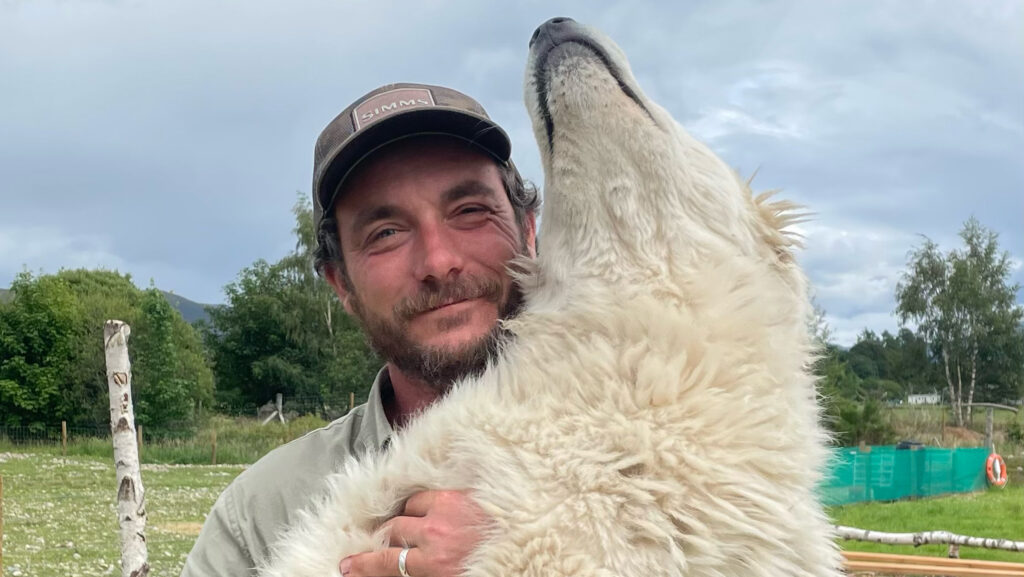How a new dog project could protect livestock from sea eagles
 Jonathan Ames with a Maremma © Jonathan Ames
Jonathan Ames with a Maremma © Jonathan Ames Farmers that have struggled with sea-eagle predation or had trouble from other predators affecting their stock and flocks may soon have a new solution available to them.
Falconry expert Jonathan Ames runs the Highland Falconry Centre near Aviemore, in Scotland, and has recently launched the “The Guardian Dog” project. This, he hopes, will benefit farmers, and wildlife, in all parts of the country.
The idea for the project came about when he and his wife moved to Scotland three years ago, and heard of the upset within farming communities that had suffered lamb predation from sea eagles (also called white-tailed eagles).
“Me and my wife spent a couple of years living in Africa when we were younger,” Jonathan explains.
During this time, he worked closely on projects relating to birds of prey, but also with cheetahs.
“There’s a charity in Namibia that runs the cheetah conservation fund, and one of their biggest projects is that they breed and supply farmers with guardian livestock dogs,” he said.
“So when we moved to the Highlands and found out about the sea-eagle problem, I looked into it and I couldn’t find anyone using livestock guardian dogs to protect their stock.
“It seems to be something that the UK just does not do, whereas in Europe and other countries it is common practice to have dogs with livestock.”
From this, Jonathan’s Guardian Dog Project was born. However, he stresses that the dogs are not just for use to deter sea eagles and they could be used for a number of other predators.
“These dogs will guard against foxes and will live with chickens, you could use them with cattle if you were worried about badgers bringing TB into your area, and you could use them with lambs and white-tailed sea eagles,” Jonathan explains.
“The whole idea of this is to try and help farmers that are having any trouble with predators. It is copying what we learned in Africa.”
Maremma dogs
The unique breed being used for this project is the Maremma – an Italian livestock guardian dog.
Big, white and fluffy by design, Jonathan’s adult male dog, Luigi, weighs in at 45kg.
The dogs are used in Italy to deter wolves, but their large presence means that they can be trained by farmers in the UK to fend off birds of prey, foxes, and other predators.
“There is a guy in Australia that has trained this breed to live with endangered penguins,” explains Jonathan.
He says that the dogs will grow up alongside the livestock that they will protect, and they will consider the stock to be a part of their pack.
“They will follow the livestock around – whether it’s chickens, sheep, goats cows – whatever they are raised with, and they will bark at anything that is out of the ordinary, or anything that they see as a threat to the livestock,” he says.
One of the other reasons that Jonathan chose this breed is that, if they are socialised with people from being a pup, they are very friendly and gentle.
“They won’t come under the dangerous dog act, because they are really good with people, but if a big predator turns up, they then turn into a guard dog.
“We really think they are the best for the UK. The ones that they use in Africa are Turkish livestock guardian dogs – they are monsters, and they are dangerous to people as well.
“The Maremmas are big enough for an eagle to perceive them as a wolf.”
Puppies
Jonathan’s dogs have recently had puppies, which, at nine weeks, have now made their way to their new homes on four farms in Scotland and England, where they will be used to deter a number of threats.
One of the farms – a free-range chicken farm with thousands of birds – will use the dogs to scare away foxes.
The placement of these puppies will give Jonathan an idea of the project’s success, which, following this initial phase, he hopes to progress by gaining funding to trial the dogs guarding sheep on open hill ground.
“We have started teaming up to register the dog project as a non-profit enterprise, so it will be a community interest company.
“This means that we are not here to make profit, but to help the community – which, in this case, is the farming and conservation community in Scotland,” he explains.

